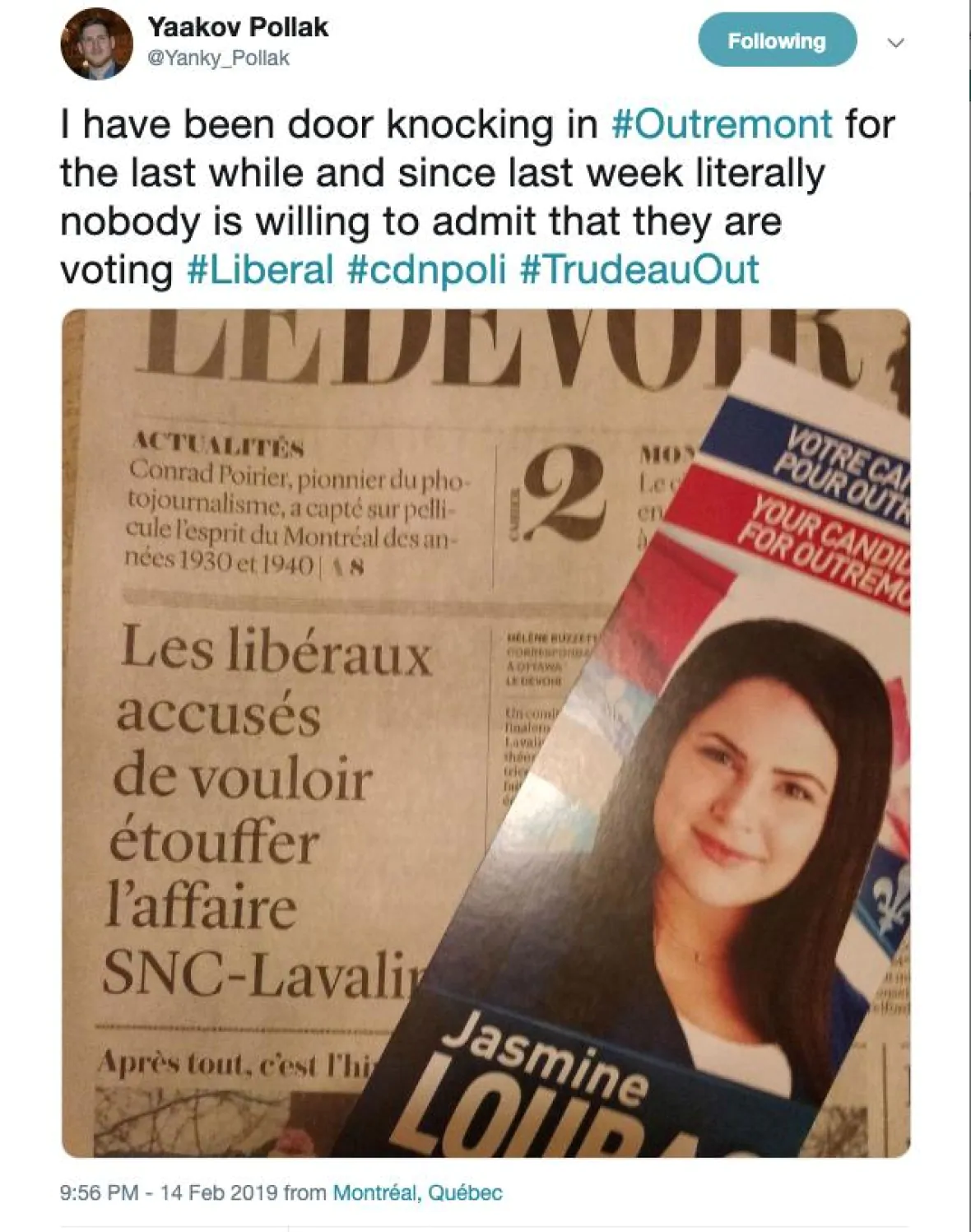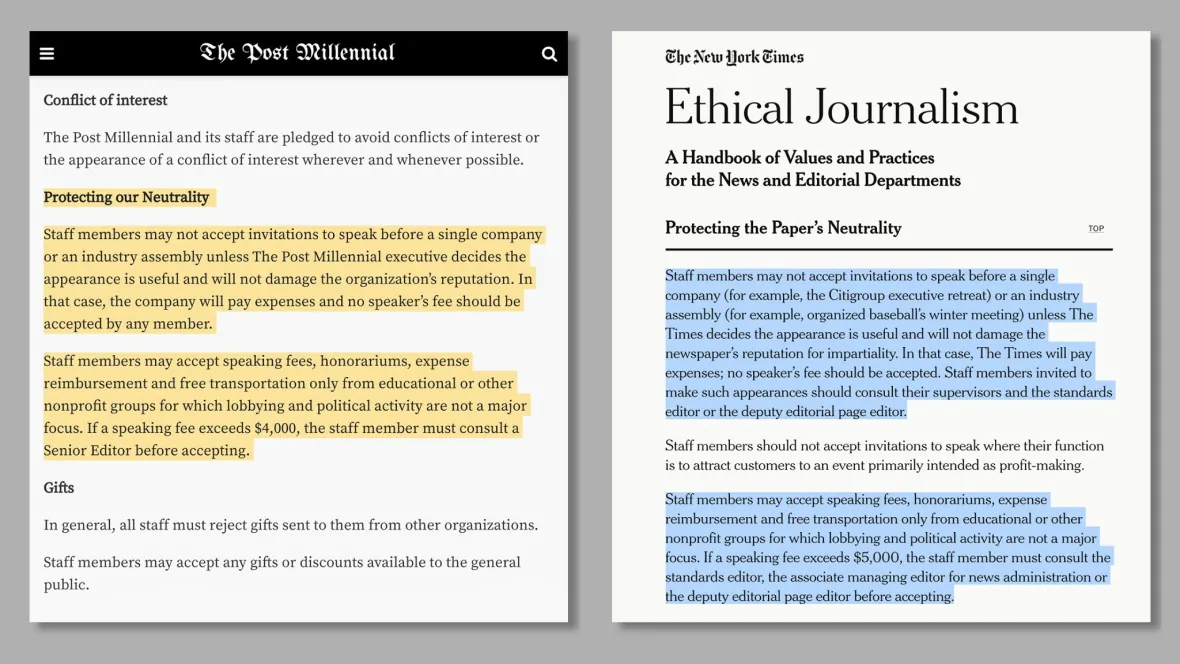Article by Jeff Yates and Kaleigh Rogers.
-
This screengrab from The Post Millennial shows an example of a story posted under the "Canadian News" section of the site.
[Image source. Click image to open in new window.]
The founders of The Post Millennial have big plans. In the next two years, they want to turn the once-obscure website they describe as a "centre-right" outlet into a news powerhouse that competes with legacy media across Canada and the United States.
On its About page, The Post Millennial dubs itself "your reasonable alternative," with a mission to "accurately and adequately report Canadian news events as they unfold and progress."
But a CBC/Radio-Canada investigation found poor transparency around its political ties -- for one thing, many of its writers have openly campaigned for conservative politicians -- and unanswered questions about its journalistic standards and funding model.
The Post Millennial covers national and regional news, as well as some sports and culture stories, and has a robust opinion section that features major conservative voices including Barbara Kay and Spencer Fernando.
The Post Millennial has been around since 2017, but its journey from obscurity began in June 2018. Over the next year, its Facebook page went from 36,000 monthly interactions to over 194,000 in May 2019, according to social media tool BuzzSumo. The amount of content posted on Facebook also jumped, from 198 posts in June 2018 to 428 in May 2019.
-
This screengrab from social media tool BuzzSumo shows the most popular stories posted on The Post Millennial over the last 12 months.
[Image source. Click image to open in new window.]
Even though its Facebook page has relatively few subscribers -- around 26,000 -- The Post Millennial's engagement there has surpassed other right-leaning media sites, like The Rebel, which boasts more than 182,000 subscribers on Facebook.
Recently, The Post Millennial has been angling for more recognition and legitimacy. The Post Millennial adopted a statement of journalistic principles late last year, formalized a masthead and applied to have one of its reporters become a member of the Parliamentary press gallery.
The outlet is also expanding, with a new office in Montreal, another planned in Toronto and a six-figure broadcast studio in the works.
The Post Millennial's audience is growing, but the site's success is increasing scrutiny of its practices, and the political ties of its staff. Seyed Ali Taghva, editor-in-chief and co-founder of The Post Millennial, said The Post Millennial is unabashedly a "centre-right news organization, the same way the Toronto Star is a liberal news organization."
But Alan Conter, a professor of journalism at Concordia University in Montreal, said the content skews more pro-conservative than centre-right.
"They're upfront about their politics, in a way. You'd have to be living under a rock to think that they were aiming to be somewhere in the centre," Conter said.
But he said that transparency is key. "There would be an issue if a reporter is not transparent about his previous political roles or if those roles are ongoing. If he's continuing to be active in political circles, that should be explicit."
Ties to conservative politicians
Since its inception, The Post Millennial has consistently published coverage critical of Prime Minister Justin Trudeau. Headlines appearing in the news section include: "Trudeau's economy is a total failure," "Trudeau Liberals threaten free speech with hints of reviving Section 13" and "The 'blame Stephen Harper' game won't fool Canadians on Trudeau's immigration and asylum failure."
The Post Millennial has published op-eds from eight Members of Parliament, all of whom are members of the Conservative Party of Canada. The columns cover topics ranging from religious freedom to data privacy.
Seyed Ali Taghva said The Post Millennial doesn't solicit columns from specific MPs, and would welcome submissions from politicians of any stripe.
Several contributors who write under the "Canadian News" banner -- not the opinion section -- have been involved with the federal Conservative Party or with provincial counterparts.
One example: Yaakov "Yanky" Pollak, who ran the Facebook page for the Conservative Party of Canada's Outremont riding and campaigned for Jasmine Louras, the riding's Conservative Party of Canada candidate, in January of this year [2019]. Pollak also runs a Facebook page and website called Elect Conservatives, which claims to have no ties to the Conservative Party of Canada.
-
This February 2019 tweet from Yaakov Pollak references his efforts door-knocking for Conservative candidate Jasmine Louras. Pollak was writing for The Post Millennial at the time.
[Image source. Click image to open in new window.]
On social media, Pollak has regularly appeared in pictures with Conservative MPs and was invited to celebrate Hannukah with Andrew Scheer at his official residence in December 2018.
Pollak told CBC-Radio Canada he is a member of the Conservative Party of Canada, but didn't see it as a conflict of interest.
"Many journalists and photographers hold memberships to political parties," Pollak wrote in an email. "It doesn't mean that they can't objectively assess and report facts, or hold opinions on issues."
Alan Conter, a professor of journalism at Concordia University in Montreal, disagreed with Pollak's explanation. "Generally speaking, reporters are not active members of a political party."
Seyed Ali Taghva brushed off the notion that there is a conflict of interest, because he said Pollak is not a full-time staffer and mostly rewrites stories published by other sites.
Another Post Millennial reporter, Alex Singh Dhaliwal, wrote an article about Alberta Premier Jason Kenney entitled, "Kenney pledges to bring 'good jobs' back to Alberta." The piece was labelled "Alberta News" and written like a regular news article, even though Dhaliwal's bio on The Post Millennial indicates he was involved in campaigning for the United Conservative Party, Kenney's party, in the recent provincial election.
Seyed Ali Taghva said he's largely unconcerned with perceived bias of his writers, again citing the Toronto Star.
"Have you checked out the Toronto Star's Wikipedia page? Right underneath [the name] it says their value is liberalism," he said. "The paper has a worldview like every single paper in this country. I dare you to find one that doesn't have a worldview. But we're very open about it, and we're hiring people from across the aisle."
Tim Groeling, a communications professor at the University of California, Los Angeles who researches political bias in media, said The Post Millennial's partisanship is evident from its story selection, so the fact that many of its writers have been involved in campaigns shouldn't be surprising.
"When I looked at The Post Millennial, I could tell within five seconds that it leaned right," Groeling said. "Once you already have writers established as partisan, then donations or voluntary activity where they're supporting a candidate, I think, are probably a grey area."
Separating fact from feeling
Other sites with partisan sympathies have cropped up in the last few years, like the more left-leaning North99 or PressProgress, but The Post Millennial stands apart for its size and ambition. Taghva, and co-founder Matthew Azrieli, also previously ran a sister site, The Nectarine, with a similar conservative lean, though they shut it down this year to focus on growing the Post Millennial.
Much of the content on The Post Millennial blurs the line between opinion and news, something Taghva chalked up to the growing pains of being a small, young site. He encouraged readers to flag anything they think is mislabelled, and said they will work to correct it.
Last fall [2018], The Post Millennial adopted a journalism ethics policy that states "the separation of news columns from editorial pages is essential." This policy also claims that "its staff are pledged to avoid conflicts of interest or the appearance of a conflict of interest wherever and whenever possible."
Both of those lines appear to have been copied from The Washington Post's Policies and Standards. In fact, The Post Millennial's ethics policy appears to have been largely plagiarized from other media sources. Approximately 75 per cent of the language in the policy is identical to declarations of principles from The New York Times, The Washington Post, The Globe and Mail and Torstar publications.
-
The language used in The Post Millennial's ethical standards, left, is identical to passages in others publications' guidelines, such as this section from The New York Times, right.
[Image source. Click image to open in new window.]
"I mean, it can be identical, but is the point correct?" Taghva said in response. "I don't think anyone cares as long as the actual rules make sense. The ethical journalism standards are meant to be the rules we follow. I would imagine that people would be happier that they're very, very similar to the mainstream media's."
In May 2019, The Post Millennial brought on a new executive: Jeff Ballingall. A former political staffer, Ballingall has been credited with helping Ontario Premier Doug Ford win the 2018 election, thanks to his third-party advertising group, Ontario Proud.
Ballingall runs a network of Proud pages (including a national version called Canada Proud), all of which are registered as third-party advertisers. Post Millennial stories are frequently shared on the Proud network of Facebook pages.
Ballingall is listed as The Post Millennial's chief marketing officer. When contacted by CBC-Radio Canada, Ballingall said he did not speak publicly for The Post Millennial and directed questions to Taghva, who said that Ballingall has no control over editorial content and is strictly involved in branding and marketing for The Post Millennial.
'They claim to be journalists'
The statement announcing Ballingall's hire also revealed that The Post Millennial received funding from "private investors." Taghva would not reveal who the investors were or how much funding The Post Millennial received.
Aside from the private investment, it's unclear how The Post Millennial makes money to fund the operation. Taghva said The Post Millennial generates revenue through subscriptions and advertisements, but would not say how many paying subscribers the site has.
The website also does not display any ads. When asked about this, Taghva said they had recently removed the ads in anticipation of a paywall they're planning to put in place.
Although The Post Millennial's founders bill it as an alternative to Canada's legacy newsrooms, much of the site's content relies on the very media outlets they claim to be countering.
For example, a recent story about China suspending the import of Canadian beef relied on a story from CBC News (which The Post Millennial misidentified as the Canadian Press), and does not include any original reporting.
"They claim to be journalists, but they mostly aggregate stuff from other sources and then do op-eds on it," said Conter. "They're perfectly within their rights to be publishing what they're doing, of course. But I would say it's less journalism and more pamphleteering."
Return to Persagen.com



